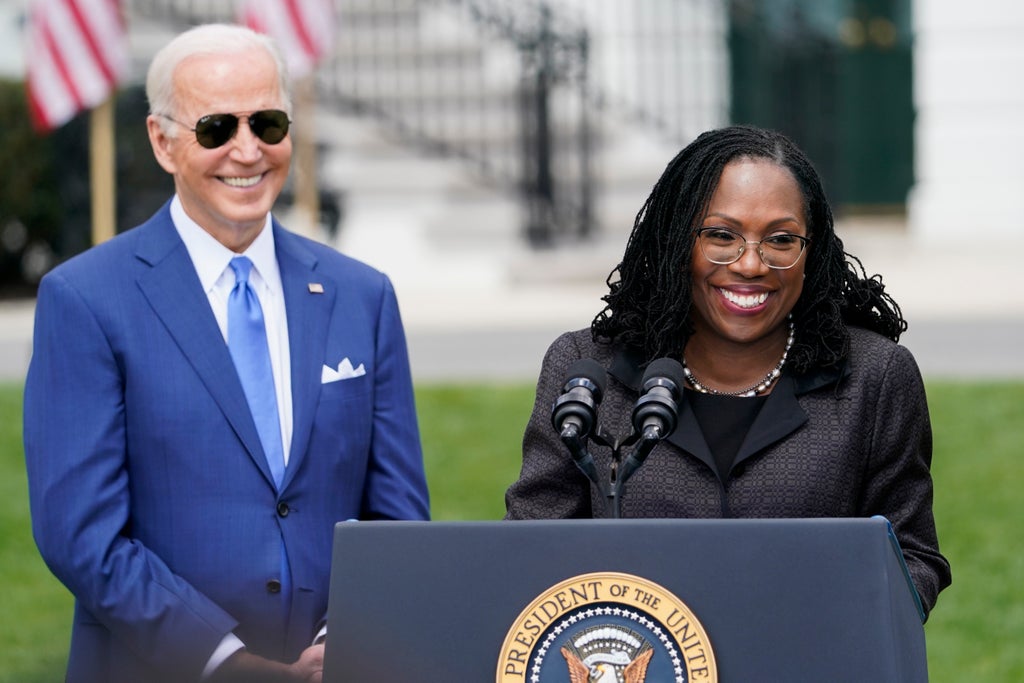
More Americans approve than disapprove of Ketanji Brown Jackson’s confirmation to the Supreme Court as its first Black female justice, a new poll finds, but that support is politically lopsided. And a majority of Black Americans — but fewer white and Hispanic Americans — approve of her confirmation.
Overall, 48% of Americans say they approve and 19% disapprove of Jackson’s confirmation to the high court according to the new poll from The Associated Press-NORC Center for Public Affairs Research. The remaining 32% of Americans hold no opinion.
Jackson's nomination fulfilled a campaign promise by President Joe Biden to name a Black woman to the court if given the opportunity. The findings suggest the confirmation did more to energize Biden's Democratic base than it did to energize Republicans in opposition, despite vocal resistance from some GOP lawmakers who were largely united in voting against her April 7 confirmation. Three Republican senators broke with their party to confirm her with a 53-47 tally.
Eighty percent of Democrats and only 18% of Republicans approve of Jackson’s confirmation to replace retiring Justice Stephen Breyer. Among Republicans, though, fewer than half — 43% — say they disapprove of the Harvard law graduate’s confirmation. An additional 37% of Republicans hold neither opinion. Only 5% of Democrats disapprove; 15% say they hold neither opinion.
It's not unusual for a relatively high share of Americans to express no opinion about a justice's confirmation. In October 2018, after the vote to confirm Justice Brett Kavanaugh following a rancorous confirmation marked by sexual assault allegations, 35% approved, 43% disapproved and 20% said they held neither opinion. And in October 2020, before the vote to confirm conservative Justice Amy Coney Barrett t o the seat of the late liberal Justice Ruth Bader Ginsburg, 30% were in favor to her being confirmed, 35% were opposed and 34% said they held neither opinion.
Jackson, 51, a federal appeals court judge in Washington, will join the court this summer when Breyer steps down. She will become the third Black person to sit on the court, following the late Justice Thurgood Marshall and current Justice Clarence Thomas. The court will for the first time have four women members and two Black members while white men will make up a minority of the court.
“It has taken 232 years and 115 prior appointments for a Black woman to be selected to serve on the Supreme Court of the United States,” Jackson said in remarks at the White House after her confirmation. “But we’ve made it. We’ve made it, all of us.”
Kimberly Brown, 41, is among those who approve of Jackson's confirmation. Brown, who lives in New York and works in health care, is an independent who leans Democratic and called Jackson's confirmation “historic."
“I just feel like it’s a historic moment to see a Black woman nominated, and then to also be confirmed to the Supreme Court, which has never been done," said Brown, who is Black. “I’m just excited that she’s able to take all of the knowledge and skills that she’s developed over the course of her career and education and apply it ... in a seat on the highest court."
Brown said she watched some of Jackson's hearings and felt Jackson “presented herself really well,” answering questions from lawmakers thoughtfully and thoroughly.
Jackson's hearings were marked by intense lines of questioning from some Republican senators ranging from her sentencing record on child pornography cases to her views on teaching books on critical race theory in the classroom.
The poll shows about half of Americans, including about a quarter of Republicans, disapprove of how GOP senators handled the confirmation process; only about 2 in 10 of Americans approve. Nearly twice as many Americans approve of how Senate Democrats handled the process. Still, about a third of Americans say they don't have an opinion either way for Republicans or Democrats.
Unlike Brown, Republican Gail Thompson, 77, of Washington state, said she felt Jackson was evasive in answering Republican lawmakers’ questions. Thompson, a retired medical assistant, said she also believed Jackson is “soft on crime."
“I don’t agree with what she’s done," said Thompson, who is white. “And I’m really sad that she’s been appointed.”
Brown and Thompson reflect not only the partisan divide but also something of a racial divide over Jackson's confirmation. Among Black Americans, 63% approve and 18% disapprove of Jackson's confirmation. Black voters were among the keys to Biden’s victory in the 2020 presidential election — about 9 in 10 supported him, according to AP VoteCast — but his approval rating among Black Americans has dipped substantially in AP-NORC polls conducted since his inauguration.
Approval of Jackson's confirmation is lower among white and Hispanic Americans, at 46% and 41%, respectively, though similar percentages across racial and ethnic groups disapprove. Many white and Hispanic Americans say they hold neither opinion.
Overall, more Americans say they approve than disapprove of how Biden handled Jackson’s confirmation, 42% to 33%. About 8 in 10 Democrats approve; about two-thirds of Republicans disapprove.
Biden's immediate predecessor, Donald Trump, nominated three conservative justices to the court — Neil Gorsuch, Kavanaugh and Barrett — giving the court a 6-3 conservative advantage, which Jackson's appointment will not change. Biden's one-time boss, former President Barack Obama, nominated two justices — Elena Kagan and Sonia Sotomayor, who is the court's first Latina justice.
The new poll shows confidence in the Supreme Court remains low, according to the poll, but is similar to what it was in a February AP-NORC poll. Eighteen percent of Americans say they have a great deal of confidence in the high court, and 54% have some confidence. An additional 27% say they have hardly any confidence.
Republicans and Democrats have similar levels of confidence in the court. Views also are similar across race and ethnicity groups.







